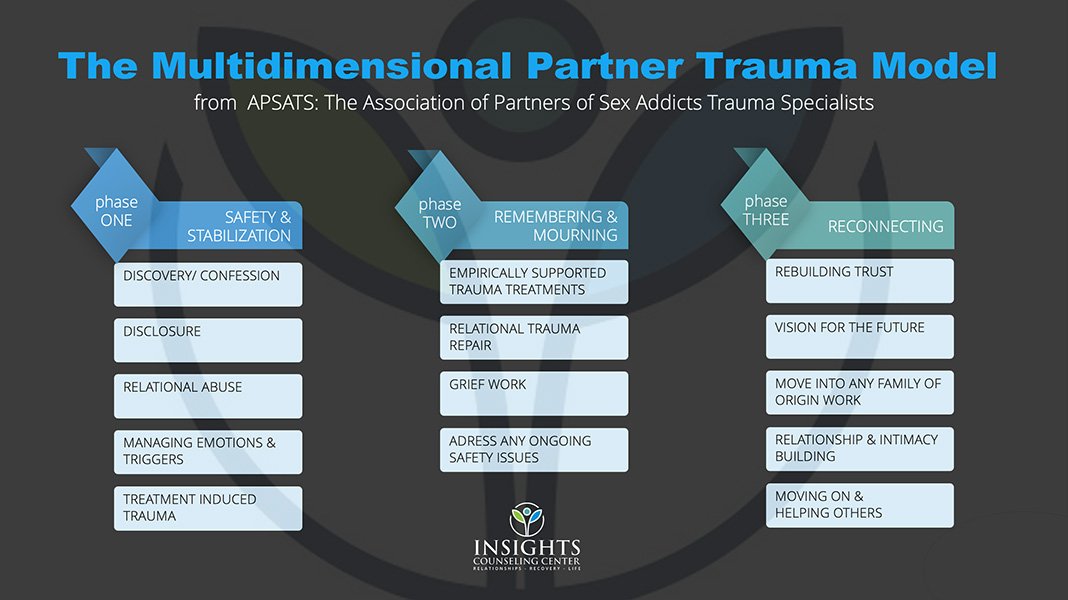
Blog

Breaking Free: Escaping the Common Thought Traps that Keep You Stuck in Anxiety
At times, we find ourselves caught in the loop of ingrained patterns of thinking, unable to break free from their grip. This is known as habituation, and it can be a real challenge to overcome. To experience personal growth and emotional well-being, it becomes essential to find alternative ways to replace these patterns.

Treating Betrayal Trauma With The Multi-Dimensional Partner Trauma Model
In the journey toward healing from betrayal trauma, the Multidimensional Partner Trauma Model provides a framework that guides individuals, couples, and families through three essential stages. Each stage is designed to address specific aspects of the trauma, with the goal of helping you find safety, process the pain, and ultimately reconnect with yourself and your loved ones.

Gaslighting: Recognizing and Healing from Emotional Manipulation
A classic example of gaslighting in infidelity. The denial and distortion of reality, paired with shifting responsibility onto the victim, can cause deep emotional trauma, making it challenging to heal from the deception and betrayal.

Understanding Suppressed Anger After Infidelity: The Storm That Is Brewing
When faced with infidelity, there are understandable reasons why some individuals may choose to suppress their anger. However, suppressing anger after infidelity is not a sustainable solution. Unaddressed anger, if left unchecked, can negatively affect our emotional and physical well-being.

How to Navigate an Emotionally Invalidating Partner: Tips for Emotional Wellness
Relationships can be challenging, but when you add an invalidating partner, things can get downright distressing. An emotionally invalidating partner can make you feel unheard, unseen, and unimportant.

Healing and Support through the Betrayal Trauma Partner Groups at Insights Counseling Center
Our Betrayal Trauma Partner Groups offer a unique blend of psychoeducation and processing, creating a safe and supportive environment where you can find solace and strength.

So How Does Full Therapeutic Disclosure Work?
In Full Therapeutic Disclosure, the information is carefully prepared with the guidance of a specially-trained CSAT therapist. Ideally, the one revealing their secrets will have achieved 90 days of sobriety and will have worked closely with their therapist for 3-4 months to create a thorough document outlining what happened, with whom, where, and how the betrayal occurred, as well as where the money was spent.

Full Therapeutic Disclosure: An Important Step in Healing
We understand the importance of full therapeutic disclosure in the recovery process. In the journey toward healing and recovery, full therapeutic disclosure plays a vital role in fostering understanding and facilitating growth within intimate relationships.

Understanding Enmeshment: A Path to Healing
In the journey of healing from emotional trauma, it is essential to shed light on the concept of parental enmeshment. This intricate and often challenging dynamic can manifest within the parent-child relationship, impacting an individual's emotional well-being well into adulthood.

Breaking the Silence: Finding Hope and Support in the Face of Suicide
Suicide is a complex and deeply distressing topic that affects millions of people worldwide. Whether you are grappling with suicidal thoughts yourself or you have been impacted by the loss of a loved one to suicide, it is important to remember that you are not alone.

Embracing Self Esteem and Self Compassion: A Journey Towards Healing
Explore the contrasts between self-esteem and self-compassion, and how embracing both can lead to healing and personal growth.

Understanding the Difference Between Codependency and Betrayal Trauma
Codependency and Betrayal Trauma may seem similar at first glance, but they actually represent distinct experiences that require different approaches to healing. It is critical to shed light on the difference between codependency and betrayal trauma to help you navigate your path towards healing and growth.

Why Nonverbal Communication Matters
Nonverbal communication encompasses all the ways in which we communicate that aren’t spoken or written. And they are just as important.

Am I Suffering From Betrayal Trauma Or Codependency: Does It Matter? Who Can Help?
Navigating a difficult relationship with a partner who struggles with addiction or infidelity can be overwhelming and confusing. It's common to feel lost amidst the various terms and definitions surrounding the emotional trauma that has surfaced in your relationship.

Finding Freedom from Intrusive Thoughts: A Path to Inner Peace
Intrusive thoughts can be unbearable. They seem to sneak into our minds without warning and immediately create feelings of anxiety, guilt, and shame. We may wonder, "Why am I having these thoughts? What do they mean?" It's important to remember that intrusive thoughts are a common experience, and you are not alone in this struggle.

Partner Assessment: iPAST
We recognize the impact of betrayal as trauma and have assessments available through our specialized training with the International Institute for Trauma & Addiction Professional (IITAP) to sort through the many components of infidelity and its impact on your marriage.
let’s talk with Teresa | Suicide
“Studies show that asking people about suicidal thoughts and behaviors does not cause or increase such thought. Asking someone directly, ‘Are you thinking of killing yourself?’ can be the bet way to identify someone at risk for suicide.”

Trauma And How Your Body Can Remember It
Trauma is defined as a response to a distressing or disturbing event or situation. Trauma can overwhelm someone’s ability to cope.
To make matters worse, the traumatic experience can be stored in your body just like any other type of memory. Each individual has a mind-body connection.

Emotional Infidelity: 4 Things You Should Know
Emotional infidelity is a type of cheating when “one partner shares emotional intimacy and connection with someone other than their partner.” With emotional infidelity, the bond that you share with the person that isn’t your partner may match the emotional bond shared with your partner. Nothing physical or sexual happens when it comes to emotional infidelity. That being said, it may still feel like some type of boundary has been crossed.

Women’s Betrayal Infidelity Group To Help Both Individual Healing And Relationships
Therapeutic group work is a combination of psychoeducation about betrayal trauma and addiction combined with processing and connection in a safe space. Here, you will find support, education, and tools to help re-establish stability in your life.
